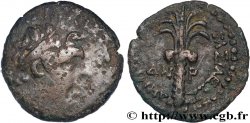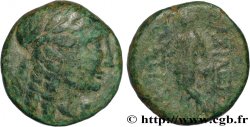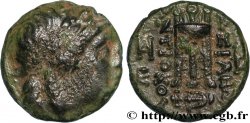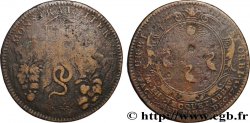v41_0286 - SYRIA - SELEUKID KINGDOM - ANTIOCHUS III THE GREAT Double unité ou dichalque, (MB, Æ 23)
MONNAIES 41 (2009)
Starting price : 110.00 €
Estimate : 200.00 €
unsold lot
Starting price : 110.00 €
Estimate : 200.00 €
unsold lot
Type : Double unité ou dichalque, (MB, Æ 23)
Date: c. 197-187 AC.
Mint name / Town : Cilicie, Soli
Metal : bronze
Diameter : 23 mm
Orientation dies : 12 h.
Weight : 8,68 g.
Coments on the condition:
Beau portrait inhabituel sur un flan irrégulier avec une échancrure à 6 heures. Jolie patine vert foncé. Frappe molle et faible au revers
Catalogue references :
Predigree :
Cet exemplaire provient de MONNAIES XXIV, n° 118 et de MONNAIES 34, n° 273
Obverse
Obverse legend : ANÉPIGRAPHE.
Obverse description : Tête d’Apollon à droite, les cheveux tombant en longues nattes sur le cou.
Reverse
Reverse description : Athéna nicéphore assise à gauche sur un trône, tenant une Niké qui couronne le nom d’Antiochus III et appuyée de son bras gauche sur un bouclier.
Reverse legend : [BAS]ILEO[S]// ANTIOCOU
Reverse translation : (Du roi Antiochus).
Commentary
Type royal tout à fait inhabituel pour Antiochus III.








 Report a mistake
Report a mistake Print the page
Print the page Share my selection
Share my selection Ask a question
Ask a question Consign / sell
Consign / sell
 Full data
Full data










